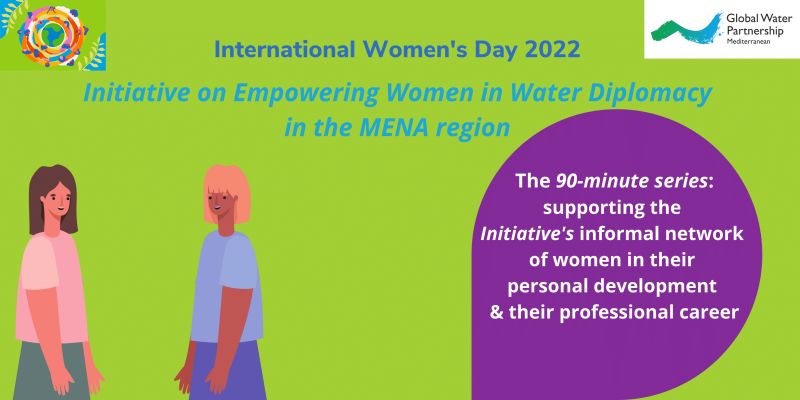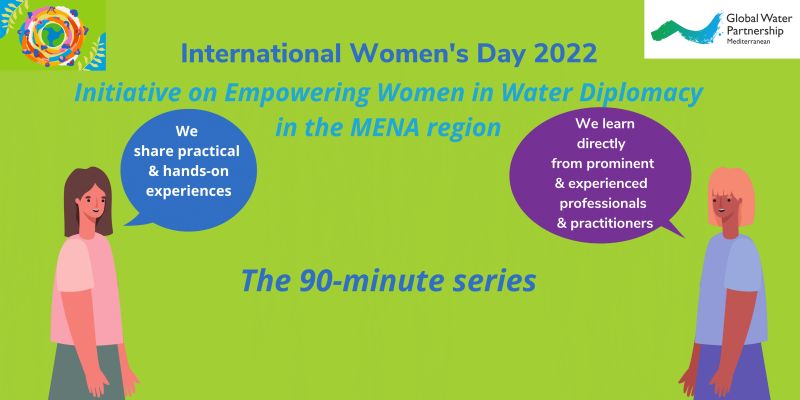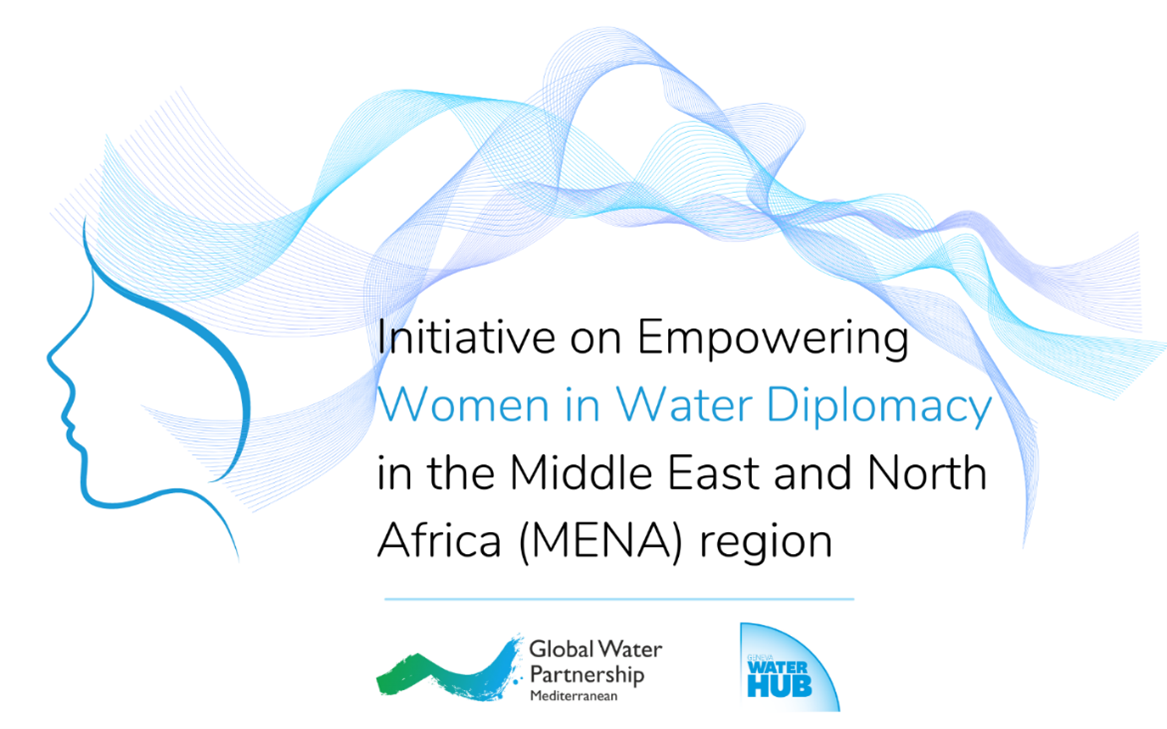The Initiative on Empowering Women in Water Diplomacy in the MENA region[1] grew out of the 2020 collaboration between the Global Water Partnership – Mediterranean (GWP-Med) and the Geneva Water Hub (GWH) concerning the elaboration of a Comparative Study across five Arab countries (Egypt, Jordan, Lebanon, Morocco and Palestine) on identifying a) the similarities and differences in the challenges female water experts face and, b) the capacity building needs in terms of the various skills of a 21st century water diplomat. The Study, prepared by six leading water experts, built upon a previous mapping exercise conducted in 2017 in three Levant countries (Lebanon, Jordan, Palestine) and adopted the same methodology of surveying and interviewing targeted women in water-related institutions.
Importantly, the analytical work of the two mapping exercises, involving almost 100 women, gave rise to a diverse, dynamic and promising informal network of female water experts across the five MENA countries that aspires to evolve into a Community of Practice on Gender and Water Diplomacy in the MENA.
Whilst pursuing a longer-term programme involving technical work along with targeted capacity building and mentorship, the Comparative Study’s co-authors, with the institutional support of GWP-Med and GWH, commenced already in 2021 the capacity building component through a series of regular interactive Q&A sessions with prominent diplomats and transboundary water cooperation experts. These were called the 90-Minute series and were built around an experiential learning process, as one of the most effective ways to promote professional integration and develop leadership skills.

The aim has been to support the Initiative’s informal network of women in their personal development and their professional career, by reflecting on experiences shared by key experts and using the knowledge for reflection on their own career trajectory and the related challenges. As a process, experiential learning is initiated by a concrete experience, which demands reflection, review and perspective-taking about the experience; then abstract thinking to reach conclusions and conceptualise the meaning of the experience; leading to a decision to act, engaging in active experimentation or trying out what has been learned.
Further to the learning part, the 90-Minute series formed a platform for exchanging, experience sharing and interacting between participants and influential diplomats/experts who have held or hold official positions, with a rich expertise including in preventive diplomacy, water diplomacy, international law, international relations and negotiations.
Throughout the experiential learning sessions, the network members were provided with a safe and neutral environment to engage, pose questions, investigate, experiment and get practical advice directly applicable to their careers. They also had the opportunity to exchange and learn directly from practitioners, and familiarise themselves with tools, know-how and expertise for the development of leadership skills. In order to safeguard the open and frank exchanges, the meetings were closed, with the material and recordings made available only to the network members.
The target audience of the 90-Minutes series has primarily involved the respondents of the survey for the two mapping exercises with priority for public sector employees, with the inclusion of a small number of other non-governmental representatives. The participants are mid-career women, working in water and diplomacy related sectors from Egypt, Jordan, Lebanon, Morocco and Palestine. The group has been enhanced with the addition of a limited number of women in their early careers from each of the five focus countries.

As for the experiences/themes, these were carefully chosen with each thematic session focusing on a specific topic related to the results of the two mapping exercises and the Comparative Study.
More specifically, in the period July-December 2021, five sessions were held virtually under the following themes and each involving two prominent speakers. It is important to note that the involvement of the esteemed speakers was all offered pro bono.
|
Session |
Theme |
Speakers |
|
1 |
What it means to be a woman leader in the water sector? |
Ms. Charafat Afailal Former Minister in charge of Water in the Moroccan government (2013-2018), currently Expert on Water Resources Ms. Maysoun Zoubi Former Secretary General of the Ministry of Water in Jordan (2008-2012), currently Expert on Water and Water Diplomacy |
|
2 |
The Art of Diplomacy and International Relations |
Amb. Kholoud Daibes former Ambassador, former Minister of Tourism, State of Palestine Amb. Hassan Janabi Ambassador (retired), former Minister of Water Resources, Republic of Iraq |
|
3 |
Conflict Resolution and Mediation: theory and practice |
Ms. Léna Salamé Lawyer, conflict management specialist, Geneva Water Hub Mr. Dimitris Faloutsos Deputy Regional Coordinator, Theme Leader on Transboundary, WEFE Nexus, and Environment, GWP-Med |
|
4 |
The involvement of Women in Foreign Policy and Peacebuilding |
Ms. Mbarka Bouaida President of the region of Guelmim Oued Noun, former Minister delegated in charge of Foreign Affairs, Morocco Ms. Ramona Nicole Manescu former Minister of Foreign Affairs, Romania, former European Parliamentarian, Vice-President of EuroMedA Foundation |
|
5 |
Communication skills and emotional intelligence in negotiations |
H.E. Marwan Muasher Vice President for Studies, Carnegie Endowment for International Peace, and ex foreign minister of Jordan Ms. Francesca Bernadini Chief, Transboundary Cooperation Section, UNECE |
And what have the network members said about the 90-Minute series experience?
Silva Kerkezian, former Project Coordinator for Capacity Building Programme on Water Integrity at Issam Fares Institute for Public Policy and International Affairs, AUB, Lebanon, whose latest work experience focused on building integrity capacities of those who manage the water sector and resources, she herself came across several cases where women were leaders and had difficulties to take leading positions due to several factors, and one of them was solely because they were women. This has awakened in her the need to continue working on building capacities of women and building her capacities to become a better leader in the water sector. Given that, she joined the series because to stay in this community of great women leaders, so that women can work together and make the world a better place and a water safe world for them and their children!
Moreover, the 90-minute series has been able to build a well informed and prepared women's community who can be the future leaders, as she stated. Through the five sessions organized in 2021, she praised the many vital aspects covered and that can shape good leaders to become great ones, like panelists who are successful leaders and inspiring negotiators, panelists from the water sector who have taken leading rolls and the pitfalls and successes they have achieved, negotiation and communication skills, emotional intelligence, and conflict resolution; and lastly, the 90 minutes sessions also did bring together women and men leaders from other sectors to showcase the importance of a good leader's skills and values that can be applied over a whole wide range of sectors, be it peace building, foreign policy, conflict resolution or International relations. She concluded that the series will be of a great added value and a baseline like-minded community to build on in future initiatives.
Nawwar H. Sabeeleish, Environmental Education Programme Manager at EPME Amman, Jordan, who comes from the most water scarce region in the world, wanted to gain the necessary skillsets and exposure to the different practices and experiences in water diplomacy. She believes that today it is more crucial than ever, to evaluate the challenges that this sector confronts, analyze, and compare lessons learnt from water conflicts, and cooperation experts over transboundary waters.
Moreover, she perceived this series as an opportunity for networking among experts and leaders in the sector, enhancing her understanding of transboundary water and further sharing it with the participants of the track II Water Diplomacy program,- which she implements at EcoPeace Middle East.
She considered that the value of the 90-minutes lies in the role that water diplomats play in the prevention and mitigation of conflicts and impact related to water scarcity and environment, as well as to environmental peacebuilding, and thus water diplomats should be the catalyst for developing PPPs and directing water sector investments.
Fairouz Zriouli, Young Executive in the Cooperation Division, Ministry of Equipment and Water, Morocco
Working in the field of cooperation, I was particularly interested in the concept of “90-minute series”; this is why I joined it to deepen my knowledge in the areas of cooperation and diplomacy and I was very keen to follow the various sessions that were organized, in particular for:
1- The concept itself: which aimed at spreading knowledge and encouraging experiences sharing of the capacity building of women's skills, in particular, women working in diplomacy, cooperation, negotiations, international law…
2- The relevance of the selected themes: the themes of the sessions are sharp, interesting, and specific; and this proves that they have been carefully identified.
3- The adopted approach: the concept is based on sharing and exchange, and I really appreciated how participants were involved through interactive exercises and the dedicated sections for “questions and answers”.
4- The high-quality of the guest speakers and panelists, who have contributed to the animation of the different sessions and who are eminent experts who have occupied / or who occupy positions allowing them to develop expertise, capitalize on know-how, and have inspiring experiences to share with the participants in the sessions…
I think the concept of the 90-Minutes series is very interesting and it would be important to continue organizing other sessions, possibly developing a complete specific program such as thematic training cycles and establishing supporting materials (written content or multimedia).
The added value of the 90-minute series is not only reflected in the strengthening of skills in the technical and scientific perspectives, but also and above all, in the human aspect of experience sharing, which are sources of inspiration and lessons to be learned!
Furthermore, another important element to highlight concerns the sessions in the series which are not only focusing on the development of the basic skills to carry out tasks, but to develop managerial, transversal and leadership skills and career development at a very high level.
Cultural specificities are also taken into consideration when dealing with several specific themes, which is also important, since the participants manage to recognize themselves in a cultural context which are familiar to them and within which they find themselves daily… with all its particularities and the challenges and constraints that come with it! I would like to thank all the people who contributed to the organization of the series and I wish them a successful continuation!
Siham Talbi, Head of Communication and Cooperation, Souss-Massa Hydraulic Basin Agency, Morocco
The reasons behind my participation to the 90-Minute series sessions of the Initiative on Empowering Women in Water Diplomacy in the MENA region are numerous. From my perspective, the water challenges for the present and future generations call for us to develop our knowledge and skills. We see women playing a prominent role in water sector; however, their perspectives are often neglected in decision-making. Therefore, gender integration in the management of water resources and water infrastructure is crucial to maintain sustainability and improves efficiency and effectiveness.
During this programme, I had the opportunity to participate to several discussions and witness many experiences shared by experts and women leaders in different fields. I have learned, not only about barriers and potential obstacles to women’s representations, but also about opportunities to improve the participation of women in water diplomacy processes, support our ability to maximize our contributions and apply the gained knowledge to build our careers.

Overall, the 90-Minute series have provided the opportunity to the Initiative’s network members to share practical and hands-on experiences and learn directly from prominent and experienced professionals and practitioners. Through emphasis on core and managerial skills, for the effective delivery of tasks and duties, but also interpersonal, communication and key leadership skills, the network members were supported in strengthening and further developing a competent career path and enhancing the opportunities for more leadership roles in water management and diplomacy-related sectors career in their respective countries.
A Booklet on the 90-Minute series is currently under finalisation and besides the full agendas and bios of the speakers, it will entail highlights from the five sessions, voices from the network members, as well as background on the process and pedagogy of the experiential learning. The Booklet will be available online at www.gwpmed.org and www.genevawaterhub.org.
[1] More information about the Initiative as well access to the Comparative Study and related resources are available at: https://www.gwp.org/en/GWP-Mediterranean/WE-ACT/News-List-Page/2021/women-in-water-diplomacy/ and https://www.genevawaterhub.org/resource/comparative-study-empowering-women-water-diplomacy-middle-east-and-north-africa-mena-region
